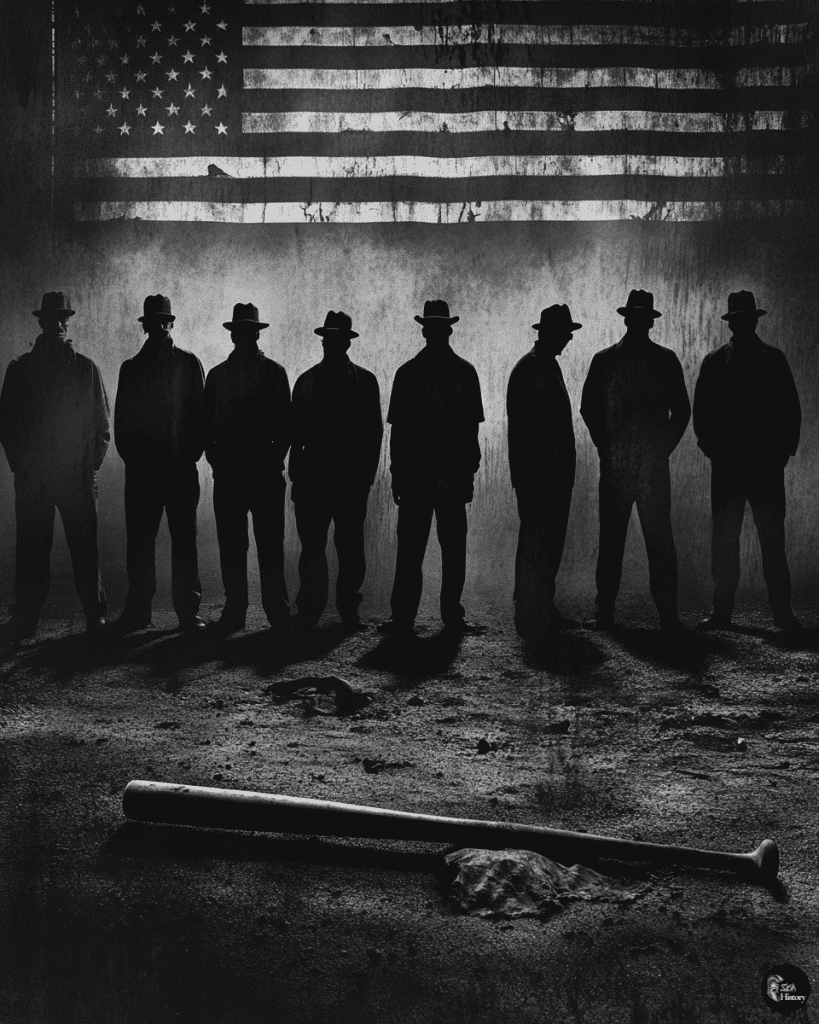The 1919 World Series stands as one of the darkest chapters in baseball history.
Eight members of the Chicago White Sox were accused of intentionally losing games against the Cincinnati Reds in exchange for money from gamblers.
This scandal rocked the sport to its core and forever changed how baseball was governed.
The eight players, including the legendary Shoeless Joe Jackson, were banned for life from professional baseball despite being acquitted in a criminal trial.
The incident became known as the Black Sox Scandal, tarnishing the reputation of the Chicago franchise and leading to significant reforms in Major League Baseball.
The scandal’s aftermath led to Judge Kenesaw Mountain Landis’s appointment as the first Commissioner of Baseball.
His iron-fisted approach to cleaning up the sport helped restore public faith in the game’s integrity.
Overview of the Black Sox Scandal
The Black Sox Scandal rocked professional baseball in 1919, forever changing the sport’s landscape.
Eight Chicago White Sox players were accused of intentionally losing the World Series in exchange for money from gamblers.
1919 World Series
The 1919 World Series pitted the heavily favored Chicago White Sox against the Cincinnati Reds.
Eight members of the White Sox allegedly conspired with gamblers to throw the series.
Key players involved included “Shoeless” Joe Jackson and pitcher Eddie Cicotte.
The conspirators reportedly received $100,000 to lose intentionally.
Despite suspicions, the series proceeded. The Reds won 5 games to 3, shocking the baseball world.
Chicago White Sox vs. Cincinnati Reds
The Chicago White Sox boasted a star-studded lineup in 1919.
Their roster included future Hall of Famers, and they were considered one of the best teams in baseball history.
In contrast, the Cincinnati Reds were seen as underdogs. Their unexpected victory raised eyebrows among fans and sportswriters.
Unusual plays and uncharacteristic errors by White Sox players fueled speculation. The conspiring players’ performance during the series was noticeably below their usual standards.
Major League Baseball’s Infamy
The Black Sox Scandal dealt a severe blow to baseball’s integrity. As details of the fix emerged, public trust in the sport plummeted.
In response, team owners appointed Judge Kenesaw Mountain Landis as the first Commissioner of Baseball.
Landis banned the eight accused players from professional baseball for life despite acquittal in a 1921 trial.
The scandal’s aftermath led to stricter gambling regulations in baseball. It also resulted in increased scrutiny of player-owner relationships and salaries.
Key Figures and Events
The Black Sox Scandal of 1919 involved several key individuals and pivotal events that shaped one of baseball’s most infamous controversies.
Eight players from the Chicago White Sox were accused of intentionally losing the World Series in exchange for money from gamblers.
The Eight Accused Players
Eight members of the Chicago White Sox were implicated in the scandal:
- Shoeless Joe Jackson (outfielder)
- Eddie Cicotte (pitcher)
- Chick Gandil (first baseman)
- Swede Risberg (shortstop)
- Buck Weaver (third baseman)
- Lefty Williams (pitcher)
- Happy Felsch (outfielder)
- Fred McMullin (utility infielder)
These players were known as the “Black Sox” due to their alleged involvement in fixing the 1919 World Series. Eddie Cicotte and Joe Jackson were star players whose participation shocked fans and teammates alike.
Role of Gamblers and Conspiracies
Gamblers played a crucial role in orchestrating the scandal.
Arnold Rothstein, a prominent New York gambler, was believed to be the mastermind behind the fix. He worked with former boxer Abe Attell and Boston gambler Joseph “Sport” Sullivan.
The conspiracy involved promising the players substantial sums of money to lose games intentionally. Chick Gandil acted as the primary liaison between the players and gamblers.
The players were reportedly offered $100,000 to throw the series, a significant amount at the time.
The scheme unfolded gradually, with some players initially reluctant to participate.
As the series progressed, suspicions grew among fans and sports writers due to uncharacteristic errors and poor play.
Trials and Acquittals
In 1920, a grand jury was convened to investigate the allegations. Several players, including Eddie Cicotte and Joe Jackson, confessed to their involvement.
However, these confessions mysteriously disappeared before the trial.
The trial began in 1921, with all eight players facing charges of conspiracy to defraud.
Despite the missing confessions and circumstantial evidence, the jury found all defendants not guilty on August 2, 1921.
The acquittal was largely due to the lack of concrete evidence and the disappearance of key documents.
The players’ lawyers successfully argued that even if they had accepted money, there was no proof they had intentionally played poorly.
Lifetime Bans and Repercussions
Despite the legal acquittal, newly appointed Commissioner of Baseball Kenesaw Mountain Landis took swift action. He banned all eight players from professional baseball for life, stating, “Regardless of the verdict of juries, no player who throws a ballgame… will ever play professional baseball.”
This decision had far-reaching consequences. Shoeless Joe Jackson, despite his .375 batting average in the 1919 World Series, was forever tainted by the scandal. The bans effectively ended the careers of all involved players, some of whom were in their prime.
The scandal led to significant changes in baseball governance. It solidified the power of the Commissioner’s office and led to stricter rules against gambling in baseball.

